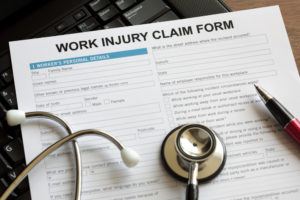Long Island Workers’ Compensation Lawyer
 If you were recently hurt on the job, you are not alone. Every single day in the state of New York, about 584 employees sustain an injury on the job or develop an occupational illness, reports the Bureau of Labor Statistics. And no industry is exempt. Workers are injured in all types of work environments from mining and construction to retail and healthcare. Even when you are well-trained and use the best safety practices, accidents can and still do happen.
If you were recently hurt on the job, you are not alone. Every single day in the state of New York, about 584 employees sustain an injury on the job or develop an occupational illness, reports the Bureau of Labor Statistics. And no industry is exempt. Workers are injured in all types of work environments from mining and construction to retail and healthcare. Even when you are well-trained and use the best safety practices, accidents can and still do happen.
Fortunately for injured workers, New York laws require employers to pay workers certain benefits if they are injured on the job or develop a condition due to their employment. Most employers are insured, so employers rarely have to pay for benefits out of pocket. Their insurance company typically pays them. Below, we discuss the requirements for workers’ compensation, the types of benefits that are available, and what steps to take after a work accident. For case-specific information or for help obtaining your benefits, call a Long Island workers’ compensation lawyer today. An experienced personal injury attorney can help to obtain the compensation you deserve and ensure your legal rights are protected. En Español.
How Can a Person File Suit Against a Negligent Party?
Under the workers’ compensation system, most employers are exempt from lawsuits filed by injured workers. Workers’ compensation is essentially a trade-off or compromise: you agree not to sue your employer, and the employer agrees to pay you benefits regardless of who was at fault. The fortunate part of workers’ compensation for employees is that you can count on the benefits without having to file a lawsuit and without the burden of proving your employer’s negligence.
However, while you cannot sue your employer, there may be other parties that contributed to the accident that you might be able to sue. For instance, if you were hurt by a defective power tool at the work site, then you might be able to sue the power tool manufacturer for damages, in addition to your workers’ compensation benefits. These types of cases are referred to as third-party claims. You should speak to a worker’s compensation attorney in Long Island about all of your legal options to maximize available resources.
Workers’ Compensation Requirements
Worker’s compensation is meant as a safety net for workers who sustain on-the-job injuries. It provides much-needed basic benefits until your injury heals and you can return to work. As long as you meet some basic requirements, your benefits are guaranteed, even if you were partly or wholly at fault for your accident.
You qualify for workers’ compensation benefits if the following is true:
- You are an employee. (Self-employed people and independent contractors are not covered.)
- Your injury occurred in the scope and course of your employment. If you were hurt at work, at a work-related event like a conference, or while running errands for your boss, your injury should be covered. You can also qualify if you have been diagnosed with a condition, such as carpal tunnel syndrome or cancer, as long as you can prove that work conditions/tasks caused your illness, e.g., repetitive typing or exposure to asbestos.
- You did not purposefully cause your injury, nor were you intoxicated or horse playing at the time of the accident.
- You reported the accident within 30 days and adhered to all the steps of filing a workers’ compensation claim.
What Types of Benefits are Available for Recovery in a Workers’ Comp Case?
Workers’ compensation benefits do not “make you whole,” but they do help make ends meet for you and your family until you are well again. There are three types of benefits available for which you or your family may qualify with the help of a Long Island workplace accident attorney: cash, medical, and death benefits.
Cash Benefits
You can receive up to two-third of your average weekly wages if you have to take time off due to your injury. The basic formula for calculating benefits is: 2/3 * average weekly wage * % of disability = weekly benefit. So, if you were earning $500 a week and are 100 percent disabled, you would receive $333. If you were 50 percent disabled, your payments would be $167. Note, your first seven days of missed work is not compensable, unless you miss more than 14 days of work.
Medical Benefits
All of your reasonable and necessary medical needs for your work injury, as well as transportation costs to and from your appointments, are covered by workers’ compensation. Everything from diagnostic testing and hospital bills, to prescriptions and follow-ups should be paid. Keep in mind, though, that in order for worker’s compensation to cover your medical expenses, your physician must be approved by the Workers’ Compensation Board (WCB), except in an emergency situation.
Death Benefits
When a worker dies as a result of a work injury or illness, his/her surviving dependents can receive the cash benefits, as well as up to $6,000 in reimbursement for funeral expenses (or $5,000 for non-Metropolitan New York counties).
Steps to Take Following An Accident
Knowing what steps to take and what your responsibilities are can make obtaining your workers’ compensation benefits a much smoother process. When you are injured on the job, you are expected to follow the basic steps below:
- Seek medical treatment. Obviously, your health is most important. In an emergency situation, either you or a coworker can call 911 and receive treatment at the nearest hospital.
- For future appointments or non-emergency cases, select an authorized provider for your care. You can ask your employer for a list, use the Health Provider Search website, or call the WCB at 1-800-781-2362 to locate an approved provider.
- Notify your employer about the injury ASAP. You must inform them in writing within 30 days of an injury or within two years after a disability from an occupational disease or you forfeit your rights to benefits.
- Contact a workers’ compensation attorney in Long Island. We can review your case, ensure you have all the evidence and documents you need, and walk you through the claims process. We can also inform you of any additional benefits or claims you may qualify for.
- Complete and file a claim for benefits using Form C-3. You will need to send the form to the WCB within two years from the date of the injury or illness. Obviously, however, you want to turn it in as soon as possible to expedite your claim. The sooner you file and win your claim, the sooner you can receive your benefits.
- Stick to your doctor’s orders. Not only is this important to speed your recovery, but skipping doctor appointments and ignoring your treatments can result in denied benefits.
- Return to work as soon as the doctor okays you to do so. If you feel your doctor or employer is rushing you back before your body is ready, bring your concerns to your Long Island worker’s comp attorney.
For more information on the initial steps to take following an accident on the job, get in touch with a worker’s compensation lawyer in Long Island.
Consulting With a Long Island Workers’ Compensation Attorney
Our Long Island workers’ compensation lawyers at Goldstein & Bashner work on a contingency basis, so we only charge you if and when we win your benefits. You have no upfront expenses. It simply makes good sense to have an attorney who knows how to swiftly navigate and prove workers’ compensation claims. Call our office today to get started.
By: Joseph M.
Title: Workers' Comp. Help
I own a moving company and was hurt on the job. Was out of work with 3 major surgery to my left foot, loss wages and medical bills that were out of control, l was lucky to find Neil Goldstein law office to try to get my life back together, I must say I was nervous about everything, but Mr. Goldstein and his office were on top of my lawsuit, I highly recommend him and his law firm, he put my life back together,








